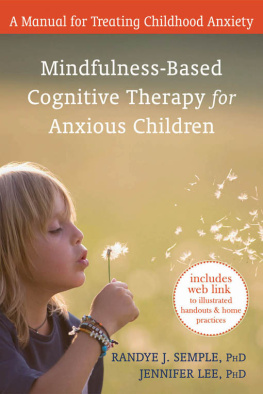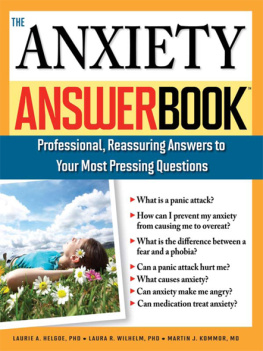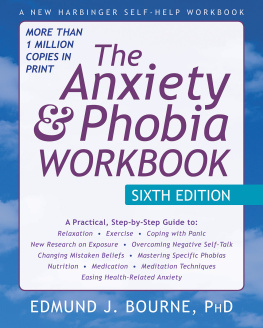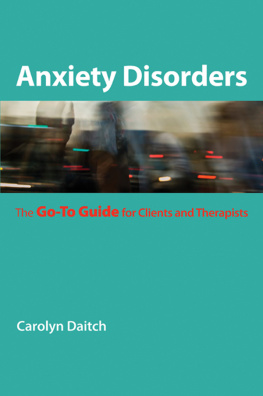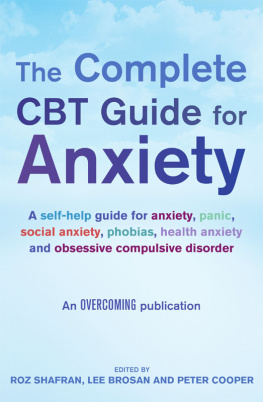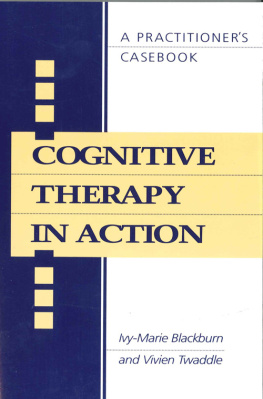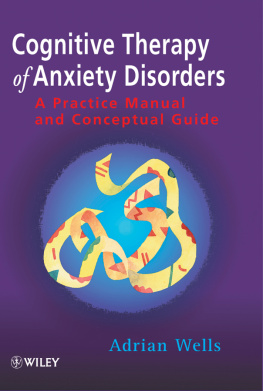D AVID A. C LARK
A ARON T. B ECK
2010 The Guilford Press
A Division of Guilford Publications, Inc.
72 Spring Street, New York, NY 10012
www.guilford.com
All rights reserved
2010 Epub Edition ISBN: 9781606234358
Except as indicated, no part of this book may be reproduced, translated, stored in a retrieval system, or transmitted, in any form or by any means, electronic, mechanical, photocopying, microfilming, recording, or otherwise, without written permission from the Publisher.
Last digit is print number: 9 8 7 6 5 4 3 2 1
These materials are intended for use only by qualified mental health professionals.
The Publisher grants to individual purchasers of this book nonassignable permission to reproduce all materials for which photocopying permission is specifically granted in a footnote. This license is limited to you, the individual purchaser, for personal use or use with individual clients. This license does not grant the right to reproduce these materials for resale, redistribution, electronic display, or any other purposes (including but not limited to books, pamphlets, articles, video- or audiotapes, blogs, file-sharing sites, Internet or intranet sites, and handouts or slides for lectures, workshops, webinars, or therapy groups, whether or not a fee is charged). Permission to reproduce these materials for these and any other purposes must be obtained in writing from the Permissions Department of Guilford Publications.
Library of Congress Cataloging-in-Publication Data
Clark, David A., 1954
Cognitive therapy of anxiety disorders: science and practice / David A. Clark and Aaron T. Beck.
p.; cm.
Includes bibliographical references and index.
ISBN 978-1-60623-434-1 (hardcover: alk. paper)
1. Anxiety disordersTreatment. 2. Cognitive therapy. I. Beck, Aaron T. II. Title.
[DNLM: 1. Anxiety Disorderstherapy. 2. Cognitive Therapymethods.
WM 172 C592c 2010]
RC531.C535 2010
616.8522dc22
2009027597
To my wife, Nancy, and our daughters,
Natascha and Christina, with sincere love
for your steadfast interest, support, and understanding
D. A. C.
To my wife, Phyllis,
our children, Roy, Judy, Daniel, and Alice,
and our grandchildren,
Jodi, Sarah, Andy, Debbie, Eric, Ben, Sam, and Becky,
with love
A. T. B.
David A. Clark, PhD, is Professor of Psychology at the University of New Brunswick, Canada. He has published seven books, including Intrusive Thoughts in Clinical Disorders: Theory, Research, and Treatment; Cognitive-Behavioral Therapy for OCD; and Scientific Foundations of Cognitive Theory and Therapy of Depression, as well as over 100 articles and chapters on various aspects of cognitive theory and therapy of depression and anxiety disorders. Dr. Clark is a Fellow of the Canadian Psychological Association, a Founding Fellow of the Academy of Cognitive Therapy, and a recipient of the Academys Aaron T. Beck Award for significant and enduring contributions to cognitive therapy. He is an Associate Editor of the International Journal of Cognitive Therapy and maintains a private practice.
Aaron T. Beck, MD, is University Professor Emeritus of Psychiatry, School of Medicine, University of Pennsylvania, and the founder of cognitive therapy. He has published 21 books and over 540 articles in professional and scientific journals. Dr. Beck is the recipient of numerous awards, including the Albert Lasker Clinical Medical Research Award in 2006, the American Psychological Association Lifetime Achievement Award in 2007, the American Psychiatric Association Distinguished Service Award in 2008, and the Robert J. and Claire Pasarow Foundation Award for Research in Neuropsychiatry in 2008. He is President of The Beck Institute for Cognitive Therapy and Research and Honorary President of the Academy of Cognitive Therapy.
T he intricacies of anxiety have continued to capture the attention of some of the worlds greatest scientists, scholars, and critical thinkers. In 1953 Rollo May stated in Mans Search for Himself that the middle of the twentieth century is more anxiety-ridden than any period since the breakdown of the Middle Ages (p. 30). If this statement characterized the last century, is it not even more applicable to the dawn of the 21st century with all the social, political, and economic threats that besiege us? Despite an end to the cold war, an era of relative global stability and cooperation, and an unprecedented rise in economic prosperity and technological advances, many in the Western world live in a state of perpetual threat and uncertainty. According to the National Institute of Mental Health (2003) approximately 40 million American adults (18%) suffer from an anxiety disorder, with serious mental illness, including the anxiety disorders, costing an estimated $193 billion in lost personal earnings (Kessler et al., 2008). No wonder the search for highly effective and accessible treatments for the anxiety disorders has become a major health initiative for most developed countries.
Twenty-five years ago, coauthor Aaron T. Beck published Anxiety Disorders and Phobias: A Cognitive Perspective with Gary Emery and Ruth Greenberg. In the first part of that book, Beck introduced a cognitive model of anxiety disorders and phobias that represented a significant reconceptualization of the etiology, nature, and treatment of anxiety (Beck, Emery, & Greenberg, 1985). At that time, research on the cognitive features of anxiety was scant, and so much of the theoretical scaffolding was, by necessity, based on clinical observation and experience. Since key aspects of the cognitive model of anxiety had not yet been investigated, some of the treatment recommendations described in the second half of the book have not stood the test of time. However, the last 20 years has witnessed a virtual explosion in basic information-processing research on the cognitive model of anxiety, the development of disorder-specific cognitive models and treatment protocols for the major anxiety disorders, and dozens of treatment outcome studies demonstrating the efficacy of cognitive therapy of anxiety. In light of the unprecedented advances in our understanding and treatment of the cognitive basis of anxiety, a comprehensive, updated, and reformulated presentation of the cognitive model of anxiety was needed so the model could be understood within the context of contemporary research findings. This book, then, was born out of this necessity. In addition, we believe that a single volume containing a detailed comprehensive treatment handbook for cognitive therapy is timely in order to encourage greater use by clinicians of evidence-based psychotherapy for the anxiety disorders.
The book is divided into three parts.. The literature review spans hundreds of studies conducted in key research centers in Western Europe and North America, confirming our perception that the main tenets of the cognitive model of anxiety have achieved a broad basis of empirical support.
The cognitive therapy approach has been applied to a wide range of psychiatric and personality conditions. Thus, present a step-by-step description for implementing various cognitive and behavioral intervention strategies for reduction of anxious symptoms. Case illustrations, suggested therapy narratives, and clinical resource materials are provided in all three chapters as training tools in cognitive therapy.




